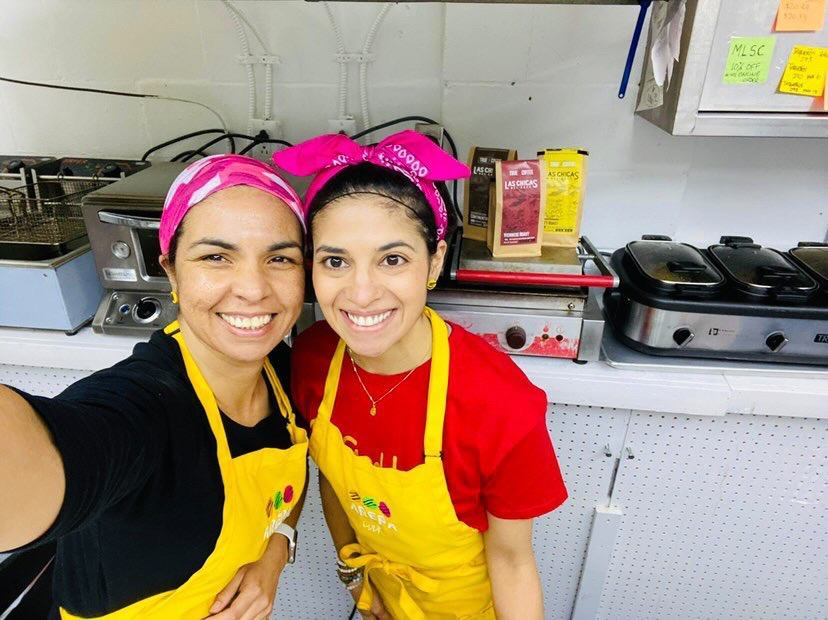Small businesses, both new and old, are having to call it quits after two years of COVID pandemic restrictions and supply chain issues creating the perfect storm for many just struggling to get by.

Since the start of the month, Ontario has been under tightened public health measures to try and halt the spread of the Omicron variant, with retail shops restricted to 50 per cent capacity and indoor dining closed at restaurants.
Arepa Ink, London’s first Venezuelan restaurant, was started up a year ago by friends Maria Avilan and Carla Calderon.
The two said their hope was to bring their love for their culture’s food – namely the Arepa, made from corn-based dough – to the people of London Ont.
“Our vision when we started was to make the Arepa a stable like shawarma or taco, and in Venezuela, we eat it for almost every occasion,” Avilan said.
But starting a new business during the pandemic presented its own challenges: from multiple lockdowns impacting customer flow to constant increases in the price of food due to supply chain issues.
“When the government started saying they were going to do something we saw ourselves affected right away, and people reacted right away. It was a rollercoaster for us because every week we had to plan what to buy,” Avilan said.
Calderon noted when they started out, a box of containers for packaging their food cost $50 but in a span of months, the price had jumped to $130. Likewise, other products like oil tripled in price, and they often had times when they could not even get ingredients.
“Everyone knows starting a business is hard, and that you have to maybe wait a while to see your investment back, but what we were seeing is instead of getting better, the environment surrounding us was not going that way,” Avilan said.
When it came to trying to find a location to accommodate their growing business, Calderon said they had little luck. Most landlords, they said, didn’t want to rent now-abandoned restaurant spaces to another new business, while others didn’t even return their calls.
Due to a series of pandemic-related issues, the two decided permanently close in December.

Arepa Ink is not alone. Cora Waschkowski is the owner of The Little Red Roaster, a coffee shop that has been around for well over 25 years. The shop’s most recent home was the courthouse in London, Ont.
When the pandemic hit in March 2020, the courthouse was one of the first buildings to close down, and the building has remained relatively empty ever since.
“When a building is sealed or closed you can’t do curbside pickup,” she said.
Waschkowski, whose lease is with the Ontario government, said despite the build being closed she was still expected to pay her rent every month with no relief.
After over a year and a half she decided to pack everything up, with the hopes of maybe finding another location once the pandemic ends, but when that will be is unknown.
For now, she continues to sell stuff online but says it’s not the same.
The Canadian Federation of Independent Business reports that in 2021, around 75,000 businesses in Ontario were at risk of closing due to the impacts of the pandemic.
Julie Kwiecinski, CFIB director of provincial affairs for Ontario says the average small business in Ontario now has an estimated $190,000 in COVID-19 debt, and that 18.5 per cent of Ontario small businesses are considering bankruptcy.
“Just because you are not locked down or not restricted does not mean you are not suffering,” she said.
Kwiecinski noted that some businesses that are allowed to be open with restrictions do not qualify for government supports despite the fact they are still seeing a massive difference in sales, while others simply don’t know what to apply for.
She said businesses, especially in the food industry, have seen the impacts of supply chain disruptions and that is not so easy for them to constantly change their business model.
“As part of a comprehensive plan to support workers and businesses, on January 7 the government announced an Ontario COVID-19 Small Business Relief Grant for small businesses that are subject to closure under the modified Step Two of Roadmap to Reopen,” the Ministry of Finance said in a statement.
The grant will provide eligible small businesses with a grant payment of $10,000, but does not provide relief to businesses like restaurants that are still permitted to be open.
On Tuesday, the Ministry of Finance announced the Ontario Business Costs Rebate Program to support eligible businesses that are required to close or reduce capacity due to recently announced public health measures aimed at blunting the spread of the Omicron variant.
Eligible businesses will receive rebate payments for a portion of the property tax and energy costs they incur while subject to capacity limits.
Kwiecinski invited businesses, even ones who are not members of the CFIB, to call them to find out about any other financial support programs that could help.













Comments